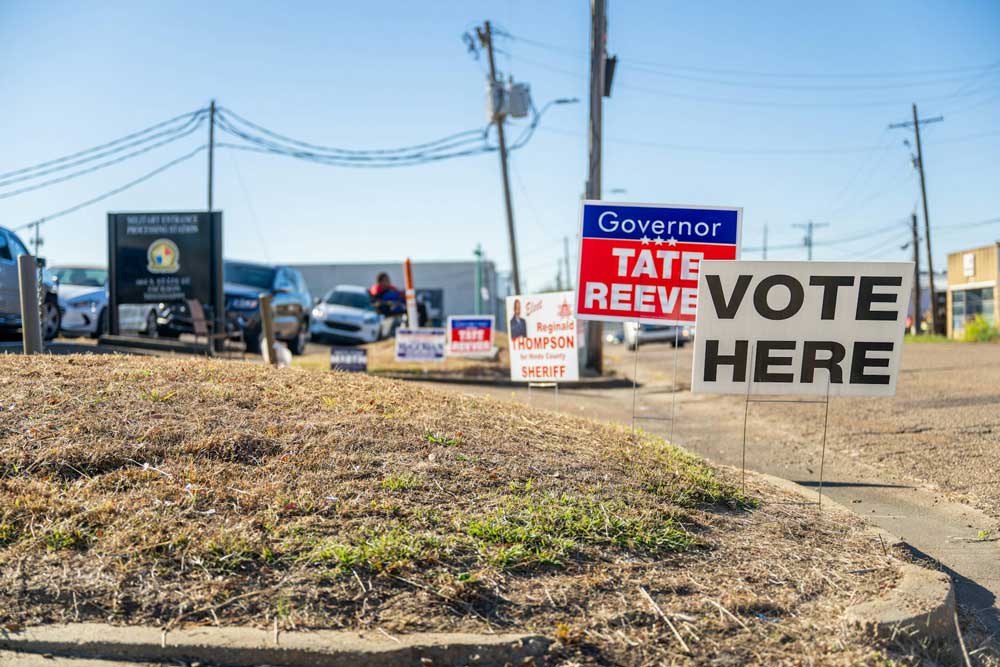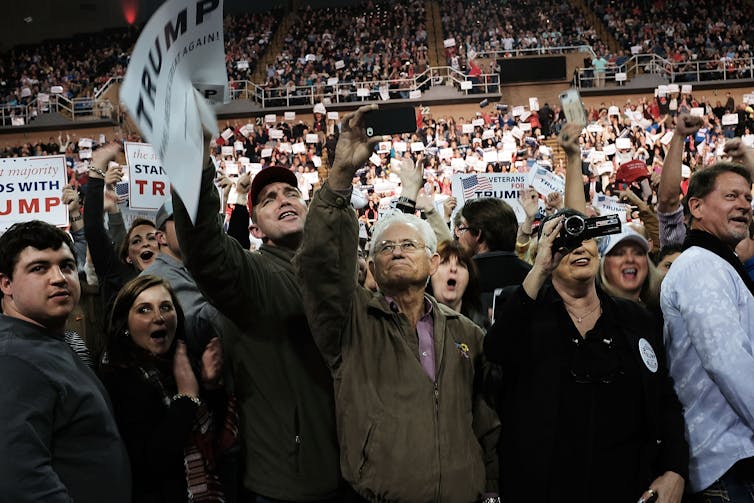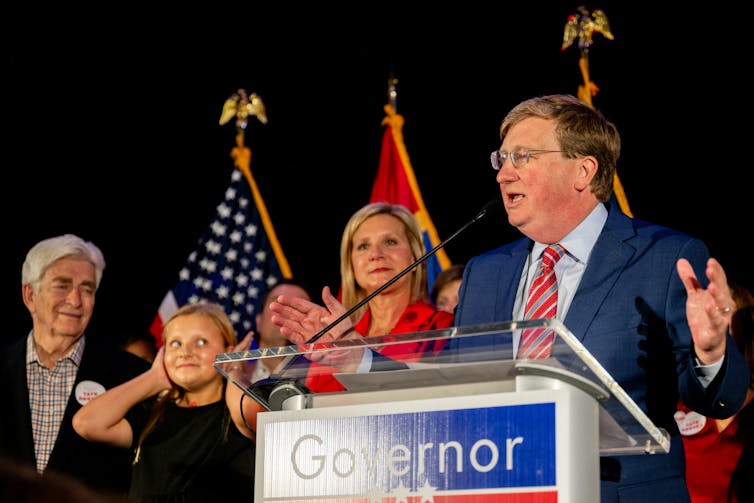
By Jeff Bloodworth
Rickey Cole, 58, is a farmer and the former two-term chair of Mississippi’s Democratic Party. If anyone understands rural Mississippi voters – and their shift from the Democratic Party to the Republican Party – it’s Cole.
“You learn from losing,” the lifelong Democrat said.
He should hope so.
In 2001, when Cole first served as party chair, Democrats controlled 7 of 8 statewide offices, including governor and attorney general, and both state legislative chambers. Twenty years later, Republicans hold all eight statewide offices and a massive 79-41 majority in the state House and 36-16 majority in the state Senate.
Mississippi, the nation’s fourth-most rural state, defines “rural” as any county with fewer than 50,000 residents or a town with a population of 15,000 or less. In the 2023 election, 51% of Mississippians lived in communities meeting this criteria.
Though Democrats still have an edge in urban centers such as Jackson and Vicksburg, the slow and repeated loss of rural voters is the cause of Cole’s woes.
“Losing them is the motif of my entire career,” he told me.
A losing tide
Cole and Mississippi are not alone.
Democrats have been losing rural voters across the U.S. since the 1960s. But the party has hemorrhaged these voters since 2000.
In 1992 and 1996, Democrat Bill Clinton won 49% of the rural vote in both elections. But by 2008, that number had declined when Barack Obama only took 43% of rural voters.
Four years ago, that number collapsed even more. In 2020, Joe Biden captured about 35% of the rural vote.
The Democratic Party’s collapse in rural America has fueled support for Donald Trump and his “Make America Great Again” movement.

Spencer Platt/Getty Images
Trump took 65% of the rural vote in 2020, up from 59% in 2016, according to the Pew Research Center.
In all, Republicans won 71% of rural white voters in 2020, a 9-point improvement over 2016.
Though only 1 in 5 Americans live in rural towns, Trump’s apparent monopoly automatically puts nearly two dozen states across the South, Midwest and Great Plains out of reach for Democrats.
One of them is Mississippi. In 2016, Trump earned 59.3% of the vote, soundly beating Democratic rival Hillary Clinton, who got 39.7%. Though Trump still won the state in 2020, his percentage dropped slightly to 57.6%, while the Democratic candidate, Biden, earned 41.1%, a little more than Clinton had in 2016.
Only themselves to blame
As the owner of MLB Research Associates, Matt Barron specializes in rural Democratic races and is considered one of the nation’s leading political strategists on the rural vote.
Beyond the policy debates, Barron said the blame falls on the Democrats.
“They don’t even try to compete in rural America,” he told me.
Cole, the former Mississippi state Democratic Party chair, agrees.
In rural America, he explained, Democrats have stopped grassroots organizing and party-building.

Brandon Bell/Getty Images
As Barron tells the story, in the hotly contested 2023 Mississippi governor’s race, for instance, the Democratic National Committee ignored local organizers and sent national campaign staffers from Michigan and Ohio to canvass rural Mississippi for votes.
As outsiders unfamiliar with the local terrain, the staffers needed a GPS to navigate the back roads. Lost geographically, they were even more adrift strategically, Barron said.
The Northern urbanites lacked any knowledge of how to push Democratic voters to the polls. The result was lower-than-expected turnout in an election that saw the incumbent, Tate Reeves, a Republican, beat Democrat Brandon Presley by 26,619 votes, or 3.2% of the 820,000 votes cast.
Cole said Presley’s loss is an example of a much larger issue.
“Our politics became nationalized by a cadre of professional operatives,” he told me. “It has become a big industry.”
Cole explained that media consultants earn a percentage of all campaign advertising spending. It maximizes their profits when they spend money in pricey urban markets and ignore rural media. Predictably, Democrats get shellacked in rural America, and the same strategists then blame rural voters for being unreachable.
A grassroots campaign
Ty Pinkins is trying to reverse the Democrats’ failure.
Slim and youthful, the 50-year-old African American army veteran is the Democratic nominee for a U.S. Senate seat in Mississippi. To defeat his Republican opponent, incumbent Roger Wicker, Pinkins is working with Cole to “build a grassroots pyramid.”
The Bronze Star recipient has put 70,000 miles on his Chevy Tahoe canvassing 67 of the state’s 82 counties. His goal is to have a campaign leader in every county and all 1,762 state precincts.
As Cole sees it, Pinkins’ grassroots campaign will last beyond the November 2024 election – and provide the key to a revived state Democratic Party.
But grassroots campaigning is not easy – and getting lost in rural Mississippi is is not always what one expects.
On a hot summer day, Pinkins took a wrong turn and found himself at a crossroads next to a rickety old house. After he knocked on the screened door several times, the 85-year-old Miss Maggie finally came out.
When Pinkins told her that he was running for the U.S. Senate, she smiled and laughed. Soon, the two shared steaming plates of fried chicken, brown gravy and sweet potatoes. She told the candidate, “Baby, now tell me about yourself.”
Once Pinkins finished, it was Miss Maggie’s turn, and the two talked until dusk. Before he could leave, Miss Maggie went back inside. She returned with a sack of coins.
“I don’t have much time left,” she told Pinkins. “I’m 85 years old. This is all I’ve got, and I’m giving it to you.”
For Pinkins, reaching rural voters is not an impossible dream – though sometimes it takes getting lost and hours of conversation to earn one vote.
![]()
Jeff Bloodworth is Professor of History at Gannon University.





























Joe D says
Unfortunately, ever since CITIZENS UNITED won a decision from the Supreme Court approximately a decade ago, putting NO LIMITS on the amount of money an individual or corporation could donate to a political campaign or organization, there has been an unfair MONEY advantage in politics.
There used to be a more financial level playing field. Now, due to the CITIZENS UNITED financial “Sky’s the limit,” free for all, now campaigns are run based on who has the MOST MONEY!!! Effectively allowing high dollar groups to ALMOST BUY ELECTIONS.
How can small town candidates compete with high dollar contributions from CORPORATIONS and High income INVESTORS, who frequently align themselves with the Republican Party for LESS corporate taxes (making taxes fall more on the middle working class), and campaigning on less support for disadvantaged citizens.
I get angry as a RETIRED NURSING ADMINISTRATOR, that I paid more taxes annually ( along with teachers , police officers, and emergency personnel) than millionaires and billionaires, who use unfair tax codes to pay minimal or NO FEDERAL TAXES, especially after the MASSIVE tax giveaway to corporations and the top 3% of incomes done in the PRIOR TRUMP administration (and he wants to cut corporate taxes even MORE, in a future presidency). We are still suffering from the National Debt he SIGNIFICANTLY increased by having no plan on how to pay for those tax cuts (Biden increased the debt too, but his administration had/has a plan to reduce the debt within 10 years…now a task passed to Vice President Harris…by having corporations and the super wealthy millionaires and billionaires pay their fair share of taxes).
Yes, the Democratic Party has not treated small rural areas as evenly as larger or more urban areas, because LIMITED money only goes SO FAR!
Look at our local state election for State senator, with Republican Senator Scott (who only won by approximately 3% of the vote, and isn’t very popular currently in his views), who has spent MILLIONS of his own money to prop up his campaign against a female Democratic candidate, who was VERY lightly funded, until only recently…and they are only a few percentage points away from each other in the pre-election polls.
Unfortunately (due to the conservative leaning majority of the current SUPREME COURT), the NO LIMIT money contributions now allow campaigns to be won, not by the BEST candidate, but by the candidate with the MOST MONEY….that’s not what the democratic process was set up to be.
Pogo says
@Jeff Bloodworth is Professor of History at Gannon University
And your employer — what would you say of their contribution to America’s current state of affairs?
As stated
https://en.wikipedia.org/wiki/Gannon_University
Look — squirrel!!!
Ann Williams says
The propaganda and rhetoric put out by Trump and the radical right wing media works. They enflame the poor, the uneducated, the uninformed and the ignorant to get them to vote with them. It is very effective and has been used in the past. It worked then and works now. Pray our Democracy and our country survives.
Samuel L. Bronkowitz says
Mississippi is an excellent example of exactly how little of a shit the democratic machine cares when it comes to rural america. In 2015 the democrats didn’t even bother to field a real gubernatorial candidate in mississippi. Let that sink in: they didn’t intend to run anyone for *governor*. A guy named Robert Gray put himself on the ballot and got the nomination without any support from the party. He didn’t even spend money to campaign, he just dropped $300 on the filing fee. He beat two other candidates that between themselves spent a total of a little more than $100k on campaigning. Hillary weeped and wailed when she got stomped by a proverbial clown but with zero effort spent on an entire state then what do you expect?